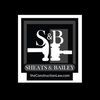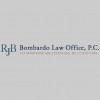
In this webinar we will review some of the key provisions for business owners, including the Paycheck Protection Program (PPP). PPP offers loans to Business Owners that can be used to cover payroll and overhead expenses and can be 100% forgiven without being taxable! Sheats & Bailey, PLLC is a law firm that specializes in the practice of commercial and industrial construction law.
Our practice services all parties to the commercial and industrial construction process. We represent contractors, subcontractors, suppliers, manufacturers, construction owners, government agencies, design professionals, sureties, and manufacturer representatives. We represent companies from across the United States and Canada throughout the court systems of the United States.
Our practice services all parties to the commercial and industrial construction process. We represent contractors, subcontractors, suppliers, manufacturers, construction owners, government agencies, design professionals, sureties, and manufacturer representatives. We represent companies from across the United States and Canada throughout the court systems of the United States.
Services
Sheats & Bailey, PLLC is a construction law firm dedicated to serving the construction industry. As a firm that practices construction law and represents all parties to the commercial and industrial construction industries, we are experienced and knowledgeable in all of the fields and all of the perspectives within the industry.
Jason's practice at Sheats & Bailey PLLC is focused on commercial and industrial construction litigation and he has represented a variety of clients including general contractors, subcontractors, manufacturers, suppliers, owners, engineers and architects.
Although Jason's practice is focused on just commercial and industrial construction litigation, the clients within that range are diversified; he represents well drillers, window manufacturers, pre-casters, steel fabricators, masons, electricians, site work contractors, demolition and asbestos abatement contractors, dry-wallers and many more.
Although Jason's practice is focused on just commercial and industrial construction litigation, the clients within that range are diversified; he represents well drillers, window manufacturers, pre-casters, steel fabricators, masons, electricians, site work contractors, demolition and asbestos abatement contractors, dry-wallers and many more.
Sheats and Bailey has created and published a handbook titled "Getting Paid: Commercial Construction Law in the United States". The three hundred (300) page handbook is a fifty state compendium of the many laws that relate to the construction industry.
The handbook outlines the laws associated with liens, payment bonds and contractor licensing, to name a few, it was designed and written so contractors, subcontractors and suppliers can read it and easily digest what their rights and responsibilities are in each state.This handbook will discuss the practical economic risks involved in commercial construction.
The handbook outlines the laws associated with liens, payment bonds and contractor licensing, to name a few, it was designed and written so contractors, subcontractors and suppliers can read it and easily digest what their rights and responsibilities are in each state.This handbook will discuss the practical economic risks involved in commercial construction.
The mechanic's lien can be one of the more effective tools for a contractor's accounts receivable manager. The mechanic's lien does more than threaten to expose the assets of the contractor or the owner, it can go to the very heart of the project. A mechanic's lien, if properly filed and maintained, can provide the liening contractor with an interest in the improvement to the real property.
In the section on mechanic's liens we learned that a mechanic's lien may only be enforceable to the extent that a lien fund exists in the hands of the construction owner and for the benefit of the contractor at the time that the mechanic's lien is filed. The lien fund serves as a restraint upon the ability of the lienor to recover through the foreclosure of a mechanic's lien.


